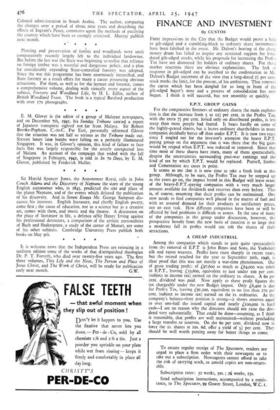FINANCE AND INVESTMENT By CUSTOS FIRST impressions in the City
that the Budget would prove a help to gilt-edged ands a stumbling-block to ordinary share investments have been falsified in the event. Mr. Dalton's beating of the cheap money drum has failed to inspire any sustained support for long- dated gilt-edged stocks, while his proposals for increasing the Profits Tax have not dismayed the holders of ordinary shares. For these market reactions there are obvious explanations. The lack of response in gilt-edged can be ascribed to the confirmation in Mr. Dalton's Budget statement of the view that a long-dated 24 per cent. stock marks the limit, for the present, of his ambitions. That removes the carrot which has been dangled for so long in front of the gilt-edged buyer's nose and a process of consolidation has now begun. I think it will succeed, but not smoothly or quickly.
E.P.T. GROUP GAINS
For the comparative firmness of ordinary shares the main explana- tion is that the increase from 5 to 121 per cent. in the Profits Tax, with the extra 74 per cent. levied only on distributed profits, is less steep than most pepple had feared. It bears hardly on some of the highly-geared shares, but it leaves ordinary shareholders in many companies decidedly better off than under E.P.T. It is now two years since I singled out for the investor's attention the heavy E.P.T. paying group on the argument that it was there that the big gains would be reaped when E.P.T. was reduced or removed. Since that time most of these shares have risen, many of them spectacularly, despite the uncertainties surrounding post-war earnings and the kind of tax by which E.P.T. would be replaced. Purnell, Sanbra and Cementation are cases in point.
It seems to me that it is now time to take a fresh look at this group. Although, to be sure, the Profits Tax may be stepped up as the years go on, the impost leyied in this Budget will leave many of the heavy-E.P.T. paying companies with a very much .larger amount available for dividends and reserves than ever before. This is, of course, assuming that their profits can be maintained. - One now needs to find companies well placed in the matter of fuel and with an assured demand for their products at satisfactory prices, not an easy task. How different companies have been or will be affected by fuel problems is difficult to assess. In the case of many of the companies in the group under discussion, however, the prospective benefit-from the new basis of taxation is so large that a moderate fall in profits would not rob the shares of their attractions.
A CHEAP INDUSTRIAL
Among the companies which stands to gain quite spectacularly from the removal of E.P.T.is John Binns and Sons, the Yorkshire silk and rayon weavers. Profits have risen sharply in recent years, but the record reached for the year to September 30th, 1946, is clear proof that this was not merely a war-time phenomenon. Out of gross trading profits of £97,600 as much as £64,000 was taken in E.P.T., leaving E33,600, equivalent to just under too per cent. (subject to income tax) earned on the ordinary IS. shares. A 6o per cent. dividend was paid. Now apply to these profit figures the tax chargeable under the new Budget impost. Only £6,4o0 is due for Proffis Tax, leaving £91,200, equivalent to no less than 270 per cent. (subject to income tax) earned on the is. ordinaries. As -the company's balance-sheet position is strong—it shows reserves equal to over one-half the issued capital and nearly £roo,000 irt hard cash—I see no reason why the directors should not raise the divi- dend very substantially. That could be done—assuming, as I think is reasonable, that profits are well maintained—without precluding a large transfer.to reserves. On the 6o per cent. dividend now in force the is. shares at los. 6d. offer a yield of 51 per cent. They should' be well worth putting away for better things to come.


































 Previous page
Previous page